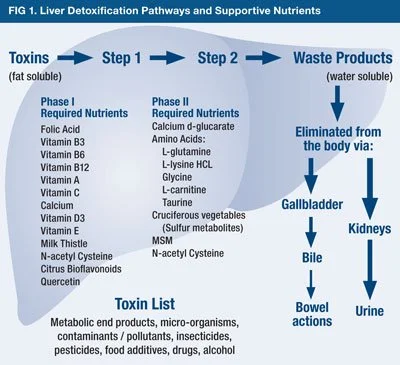let’s talk detox
Spring has sprung! As the seasons change and warmer months are on the horizon, many of us feel the urge to tidy up and rejuvenate — both our homes and our health. This time of year often brings on the popular health trend of a “detox.” While this concept has become a trendy buzzword for teas, meal plans, workout memberships and a million different supplements (hello, red flags!), it’s important to understand what detox actually means. Our main event when we’re talking detox : the liver.
Two Phases of Liver Detoxification
The liver plays a crucial role in detoxification because it’s here that toxins are transformed into less harmful substances that will eventually get excreted from the body. There are two main phases that our liver is in charge of:
Phase I : In this phase, enzymes in the liver break down toxins from our blood into smaller, more water-soluble molecules. This transformation prepares the toxins for further processing in Phase II.
Phase II : Here, the liver conjugates/connects the toxins with other substances, making them easier to excrete. This process can mean binding the toxins with amino acids, sulfur, or other molecules to make them less harmful and easier to excrete through bile or urine.
Liver Support
Our livers are working 24/7 around the clock to detoxify our blood all the time. So really, as long as you have a well-functioning liver, you are ALWAYS “on a detox!” But still, many of us are looking to optimize this process especially since our air is polluted, our environmental toxic load is high, and our hormones are sometimes not helping the situation. So how can we help out our livers?
In the diagram below, you can see the two phases of liver detoxification laid out. Within each phase, there are nutrients that are essential to keep the operation running smoothly. Some can be found in the diet (vitamins, cruciferous veggies, amino acids), some can be optimized by supplementation (N-Acetyl Cysteine, quercetin, MSM) and some are botanicals that give the liver a natural boost (milk thistle, dandelion).
Other Detoxification Pathways
The liver is a big player in our natural detoxification system, but it’s not the only one! We also need to make sure that our pathways of elimination are open in order to ensure that the toxins and waste are able to leave the body. These pathways of elimination include: sweat, bowel movements, urination and breath.
Naturopathic Tips to Optimize Your Detox
Nutrition : Ensuring you’re getting adequate amounts of the vitamins and nutrients above by eating a diet rich in fruits, vegetables, whole grains, and lean proteins. Adding foods like garlic, onions, and cruciferous vegetables (e.g., broccoli, cabbage) can add some extra support.
Bowel Movements & Urination : Including fibre in your diet as well as staying hydrated can help in achieving regular bowel movements, which is essential at removing waste from the body. The hydration also helps in promoting urination and the flushing of toxins through urine, supporting kidney function.
Sweating : Through sweat, our bodies can eliminate certain toxins, making regular exercise and sauna sessions beneficial for detoxification.
Breath : Deep breathing exercises can aid in the removal of carbon dioxide and other volatile toxins from the body.
Botanicals : Consider teas like milk thistle, dandelion root, and turmeric which have supportive and protective qualities to the liver. These can be a particularly helpful option when our bodies are taking on a higher toxic load than usual (ie. after a night of drinking, during a round of antibiotics, etc).
Overall, detoxification is not just a trendy fad; it's a natural process that our bodies are designed to perform. By understanding and supporting the natural detox pathways through lifestyle habits, intentional eating and botanical support, we can enhance our overall well-being and Spring into a new season of health with a deeper understanding of our body!
*Disclaimer: The information provided in this blog is for educational purposes only and is not intended as medical advice. It is always recommended to consult with a healthcare professional before starting any new health-related practices or making significant changes to your diet or lifestyle.

